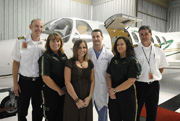August 5, 2010
 |
| Download image. |
BIRMINGHAM, Ala. - Ashley Hagood doesn't remember her first airplane ride. The 23-year old North Alabama woman was unconscious, aboard the University of Alabama at Birmingham Critical Care Transport jet, as it made a mad dash from Panama City, Fla., to Birmingham, Ala., in an attempt to save her life.
It was supposed to be a week of sun, sand and surf for Ashley's extended family. Three generations of the Hagoods were vacationing on Florida's Gulf Coast. Ashley had even brought her new boyfriend, Mark. But on the second night of the trip, their idyllic vacation became a nightmare.
Ashley woke in extreme pain. Abdominal pain unlike anything she'd ever felt before. Maybe it was food poisoning, but she didn't think food poisoning hurt this bad. There was an incredible pressure on her chest, her stomach was heaving. The family hustled her to a local hospital where physicians made a surprising discovery: She had a large mass on her liver that had ruptured. And she was bleeding internally, still in great pain.
"I heard them say internal bleeding, mass, liver...and I figured I wasn't going to make it," Ashley recalls. "I told everybody in my family good-bye."
The local hospital knew that Ashley needed specialized care - and she needed it fast. The UAB Critical Care Transport team was already making preparations to fly to Panama City to collect a different patient, but Ashley took precedence. The team, two pilots and two flight nurses, was assembled at the Birmingham airport, prepping their flying intensive care unit (a Cessna Citation Bravo jet), when the call came in.
The crew was in Panama City in 40 minutes, flying right at 500mph. "I hadn't seen anyone that pale," flight nurse Regena Bragwell, RN, remembers thinking as they loaded their patient. With partner Chana Jones, RN, she pumped fluids and pain medications into Ashley, and told the pilots, "Fly fast."
They did. The return flight, Ashley's first, took just 35 minutes with favorable winds and altitude. Ground transportation between hospitals and airports took longer than it did to make the 235-mile trip to Birmingham. Her parents and Mark made the long drive back in near-silence, wondering if she'd still be alive when they got to UAB.
She was rushed to intensive care where the flight crew worked with UAB's Medical Emergency Team and the ICU staff to stabilize her, infusing blood and monitoring her vital signs. Then liver surgeon Steve Bynon, M.D., removed a football-sized mass, a benign tumor called an adenoma, that was entwined around her liver. Bynon, who says Ashley is lucky to have made it to the operating table alive, says the young woman should now make a complete recovery.
A few weeks after her discharge from UAB, Ashley came back and met the team at the CCT hanger at the Birmingham airport. She chatted with Regena and Chana as they recounted the trip, and got a tour of the jet she doesn't remember with pilots Justin Koenig and Jeff Cotton. Her mom Joyce took some photos, and thanked each member of the team who'd played a part in saving her daughter.
The Critical Care Transport program is now 27 years old, and UAB is one of the few hospitals in the country that have a medical transport jet in addition to ground transportation. UAB has transported more than 37,000 patients and flown or driven more than 27 million miles over the years. Team members don't get many chances to meet a patient again; it's a rare and appreciated opportunity.
"If you asked me why we have a Critical Care Transport program, I'd say because of cases like this one right here," said Kevin Barlotta, M.D., the medical director for CCT. "People like Ashley Hagood are the reason that CCT exists."
"How do you say 'thank you' to somebody who saved your life?" asked Ashley. " If it hadn't been for them I wouldn't be here. I'm so appreciative that these people and this service are available.
"I can't imagine how many lives they touch, how many people they save every day."
About UAB's Critical Care Transport
Critical Care Transport is a hospital based, inter-facility transport program for patients in the United States and worldwide that require transport from one medical facility to another via jet or critical care ground ambulance.
About the UAB Health System
The UAB Health System includes all of the University of Alabama at Birmingham's patient care activities, including UAB Hospital, the Callahan Eye Foundation Hospital and The Kirklin Clinic. UAB is the state of Alabama's largest employer and an internationally renowned research university and academic health center whose professional schools and specialty patient care programs are consistently ranked as among the nation's top 50; find more information at www.uab.edu and www.uabmedicine.org.